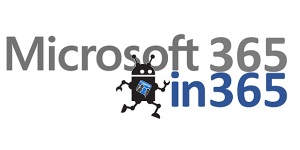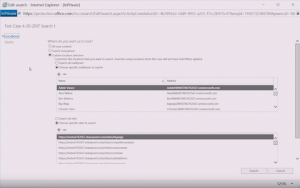Import Non-Office 365 Content for Advanced eDiscovery Analysis
What It Is:
Office 365 Advanced eDiscovery uses machine-learning and predictive analytics to refine and de-duplicate the data subset for review, allowing you to focus your eDiscovery efforts on the most relevant content, whether from within Office 365 (Exchange Online, SharePoint Online, OneDrive for Business, Skype for Business, Office 365 Groups, and Microsoft Teams) or outside, via the new import utility. Why is this important? If you’ve ever participated in a large eDiscovery effort, you know that maintaining parallel analysis effort across data that should be in a single case, but comes from separate sources, adds additional complexity and risk (and time) to the process. By allowing users to import non-Office 365 data into a single location, teams can move a copy of their imported data to an Azure container and analyze *everything* that is relevant using Office 365 Advanced eDiscovery.
 High-level Description:
High-level Description:
Broader description of what is possible through Advanced eDiscovery from Support.Microsoft.com:
With Advanced eDiscovery, you can better understand your Office 365 data and reduce your eDiscovery costs. Advanced eDiscovery helps you analyze unstructured data within Office 365, perform more efficient document review, and make decisions to reduce data for eDiscovery. You can work with data stored in Exchange Online, SharePoint Online, OneDrive for Business, Skype for Business, Office 365 Groups, and Microsoft Teams. You can perform an eDiscovery search in the Office 365 Security & Compliance Center to search for content in groups, individual mailboxes and sites, and then analyze the search results with Advanced eDiscovery. [Read More]
More specific to the the new import capabilities, also from Support.Microsoft.com:
Not all documents that you may need to analyze with Office 365 Advanced eDiscovery will live in Office 365. With the Non-Office 365 content import feature in Advanced eDiscovery you can upload documents that don’t live in Office 365 (except PST files) into a case linked, Azure storage blob and analyze them with Advanced eDiscovery. This procedure shows you how to bring your non-Office 365 documents into Advanced eDiscovery for analysis. [Read More]
Recent News/Media:
“Here’s What’s New in November for Office 365”
Advanced eDiscovery is a tool that helps analyze information about a business topic or specific client. Office 365 E5 subscribers can upload documents from outside Office 365 with the Advanced eDiscovery content import feature. The Advanced eDiscovery tool provides enterprises with one way to compile and analyze compliance processes to get things done more efficiently. [Read More]
“New in November–Save time, stay secure and do more”
eDiscovery is a tool that helps organizations analyze data across Office 365 to identify information that they have stored about a person or topic. Now Office 365 E5 subscribers can upload documents from outside Office 365 and analyze them with Advanced eDiscovery using the new content import feature. This extends the benefits of Advanced eDiscovery beyond Office 365, providing organizations with a single way to discover content relating to compliance matters from across their organization. [Read More]
Support Articles:
“Use Content Search to search third-party data that was imported to Office 365”
You can use the Content Search eDiscovery tool in the Office 365 Security & Compliance Center to search for items that were imported to mailboxes in Office 365 from a third-party data source. You can create a query to search all imported third-party data items or you can create a query to only search specific third-party data items. Additionally, you can also create a query-based Preservation Policy or a query-based eDiscovery hold to preserve third-party data in Office 365.
For more information about importing third-party data and a list of the third-party data types that can be imported to Office 365, see Archiving third-party data in Office 365.
The article goes on to provide guidance on how to properly construct your queries. [Read More]
Relevant Videos:
Advanced eDiscovery Analytics Solutions: How to Efficiently Organize and Reduce Data for Review [Office Videos on YouTube] More recent video demonstrating some of the latest eDiscovery capabilities.
How Microsoft leverages Office 365 eDiscovery capabilities [Office Videos on YouTube] If you’re new to Office 365 eDiscovery tools, this is a great video that walks you through how one team actually leverages the advanced features.
How Microsoft Legal drives down eDiscovery costs with machine learning in Office 365 – BRK3102 [Microsoft Ignite] Additionally, this is an Ignite session giving you an overview of what was covered in the last video, but at more of a 10,000 foot level.
Microsoft Tech Community Discussions:
Post from Alym Rayani, director, Office 365 security & compliance team
While the amount of data being generated and stored in Office 365 is growing at an exponential rate, many organizations still have data in legacy file shares and archives. Data is also being generated in other cloud services which may be relevant for an eDiscovery case surrounding a Data Subject Request. Analysis of non-Office 365 data allows organizations to import the case-specific copy of such data into a specifically assigned Azure container and analyze it using Office 365 Advanced eDiscovery. Having one eDiscovery workflow for both Office 365 and non-Office 365 data provides organizations with the consistency they need to make defensible decisions across the entire data set of a case.
This feature is currently in preview and requires an Advanced eDiscovery license for each user whose data is being analyzed. Later this year, in addition to Advanced eDiscovery licenses this feature will require the purchase of the eDiscovery Storage plan for all non-Office 365 data imported into the specifically assigned Azure container for analysis by Advanced eDiscovery. The eDiscovery Storage plan comes in increments of 500GB of storage and is priced at $100 per month. [Read More]






